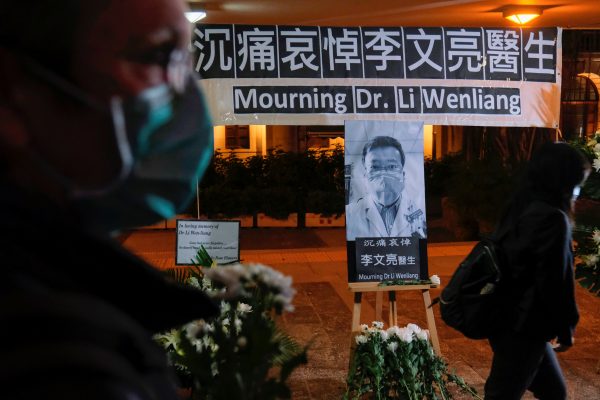The virus was first reported on 31 December 2019 by the Health Commission of Wuhan. But the night before Dr Li Wenliang, who worked in the Wuhan Central Hospital, sent a message to a private social group on WeChat alerting his medical friends of infected cases, advising them to wear protective gear. Some members in his group later circulated his message on other public platforms.
Even such an ordinary act of information sharing among colleagues was not tolerable as it concerned a sensitive subject. On 1 January, the Wuhan Police announced that they had called in eight people for questioning about spreading rumours. Among them was Li, who was required to sign an undertaking that he would stop such illegal activity which had ‘severely disturbed social order’.
As the virus spread and anger towards the Wuhan authorities on their initial under-reporting grew, Li’s action resonated among Chinese citizens, as the whistle-blower on the epidemic. He himself was later hospitalised after contracting the virus and died in the early morning of 7 February. On his sickbed he said in a number of news interviews that ‘a healthy society should not speak in one voice’.
In the hours before his death, millions of Chinese citizens prayed for a miracle. Two hashtags about his death drew 670 and 230 million reads respectively on the popular social media platform Weibo by 6am on 7 February. As demand for freedom of speech circulates on the internet in China, Li is widely mourned as a hero.
A few days before Li’s death, the Wuhan authorities started producing their own sanctioned hero. The Wuhan Evening News reported on 2 February that the first person who reported cases of the new virus was actually Chinese Communist Party member Dr Zhang Jixian, who works in the Hubei Province Integrated Hospital of Chinese and Western Medicine. Zhang was said to have reported cases of patients to her supervisor on 27 December 2019. Those cases were reported to the health authorities in Wuhan City and Hubei Province two days later. The Hubei authorities commended Zhang for her contribution on 6 February, just before Li’s death.
Much of the anger expressed by Chinese internet users has been directed towards local officials. But the Wuhan authorities, in a move to shift the blame to the central authorities, said in an interview on 27 January with China Central Television (CCTV) that they were not able to report the virus until authorised by the central authorities.
Central authorities may be partly responsible for the delay in combating the epidemic. The first public notice on 31 December reported 27 cases of pneumonia, but the public was assured that no clear evidence of person-to-person transmission had been found. The Wuhan Health Commission later announced that the number of cases had reached 44 on 3 January and 59 cases on 5 January.
The number of reported cases then dropped to 41 on 11 January. The Wuhan Health Commission continued to update the number of reported cases every day. On 18 January the figure was said to be 45. This figure suddenly surged to 198 on 20 January, but the Wuhan officials still maintained that no close contacts of the confirmed cases had shown symptoms. That night a senior expert at the National Health Commission (NHC) Zhong Nanshan confirmed that person-to-person transmission had been found and that 14 medics had been infected.
A probing news report published on 5 February revealed that a reduction in new cases between 5–18 January was apparently the result of a very high standard of case confirmation set by the NHC. The reported cases increased after the standard was lowered following the visit of a second expert group from the NHC.
Although the NHC first sent an expert group to Wuhan on 31 December 2019, Xi Jinping did not instruct the State Council until 20 January to lead the prevention and control of the epidemic and charged local authorities with the responsibility to implement this work.
The Wuhan authorities closed off all traffic in and out of the city on 23 January, two days before Lunar New Year. Xi Jinping’s New Year speech was met with anger among Chinese citizens as he failed to mention Wuhan. While Premier Li Keqiang has been seen visiting hospitals wearing a face mask, Xi until recently remained in his office, and his role has been promoted as the person in charge of the combat against the epidemic.
With CCTV airing a special program to praise heroes of the novel coronavirus epidemic, the central authorities are attempting to co-opt the collective support for the medics as love for a strong and united China. Dr Li Wenliang is acknowledged in a long list of names mentioned in the program, but Dr Zhang Jixian‘s name was not included in the report about the program dispatched by Xinhua News. With no mention of freedom of speech in the CCTV program, this is not the China that Li called for on his deathbed. Meanwhile, the central authorities have laid blame on the party secretaries of Wuhan city and Hubei province by removing them both from their positions.
Joyce Y M Nip is a Senior Lecturer in the Department of Media and Communications and the Department of Chinese Studies, The University of Sydney.
The author thanks Xuanzi Xu, PhD candidate at the Department of Government and International Relations, The University of Sydney, for contributions to the research of this article.
This article is part of an EAF special feature series on the novel coronavirus crisis and its impact.

